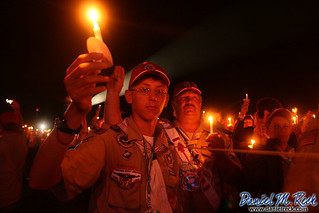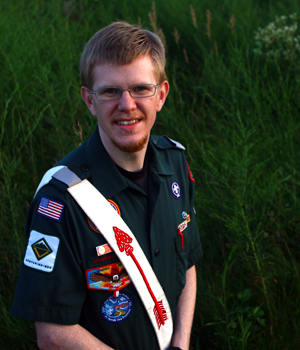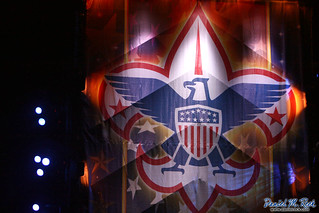A century ago today, Arthur Eldred was the first young man to earn the Eagle Scout award from the Boy Scouts of America. The 17-year-old had completed his twenty-one merit badges with ease, and passed his board of review—in front of the BSA’s founders, no less—“with ease,” according to The Wall Street Journal’s Michael S. Malone.
In the decades since, the Eagle Scout award has become synonymous with success. It is the highest rank a young man may earn in the BSA, and requires that he hold leadership offices and participate in, design, and ultimately lead major community service programs. The nearly two dozen merit badges required cover a range of competencies, from world citizenship to lifesaving skills to financial management.
Historically only about 2% of Boy Scouts ever attain the award. “These Eagles in turn have changed the face of American culture in ways both obvious and unexpected,” says Malone.
Notable scientists, artists, Nobel Prize winners, politicians, military heroes, corporate and community leaders, and President Gerald Ford are all counted on the roster of Eagle Scouts. So too is Neil Armstrong, the first human to walk on the moon.
An Ambiguity: "Morally Straight"
In all these years, the world has certainly changed. But scouts the world over still take the following oath: “On my honor I promise that I will do my best, to do my duty to God and my Country, to help other people at all times, and to obey the Scout Law.”
In the United States, they also have promised for decades to keep themselves “physically strong, mentally awake, and morally straight.”
Those last two words have been the center of a brewing storm on the horizon, which is now thundering directly overhead.
The fury surrounds the BSA’s standing policy of prohibiting adult members who are “open or avowed” homosexuals, atheists, or agnostics, on the grounds that this violates the fundamental principles of the BSA. With recent petitions to change the BSA policy soundly rebuffed, along with a steady change in public opinion regarding acceptance of gays and lesbians in society, a swell of Eagle Scouts have recently begun returning their badges to the BSA headquarters along with well-composed letters. Chris Baker wrote in his letter, that as a Boy Scout, "I was taught that it is wrong to exclude people, whether based on race, physical ability or sexual orientation."
All scouts across the globe, including those here in the United States, swear to do their “duty to God,” to observe their religious and spiritual principles. In a recent nationwide study performed at Baylor University, researchers Byron R. Johnson and Rodney Stark found that this trait is particularly strong in Eagle Scouts when compared to other scouts or non-scouts.
 It is no surprise then that religious organizations would be interested in sponsoring—known as “chartering” in BSA parlance—local Boy Scout units. Of course, there are many different religious traditions observed in the United States, all with different interpretations of “morally straight.” (For this discussion, let’s remember the era in which “straight” was added to the Scout Oath in the United States. In the middle of the 20th century, “straight” meant proper and “gay” meant happy.)
It is no surprise then that religious organizations would be interested in sponsoring—known as “chartering” in BSA parlance—local Boy Scout units. Of course, there are many different religious traditions observed in the United States, all with different interpretations of “morally straight.” (For this discussion, let’s remember the era in which “straight” was added to the Scout Oath in the United States. In the middle of the 20th century, “straight” meant proper and “gay” meant happy.)
As it turns out, the single largest proportion of Boy Scouts, 13 percent, are members of the (Mormon) Church of Jesus Christ of Latter-Day Saints, which sponsors 30,000 scouting units in communities across the United States. Nearly all Mormon boys participate in scouting, and the church’s leadership has said that they would all withdraw from the BSA if they were to change their policy to openly permit homosexuals.
The United Methodist Church is the second largest sponsor of local units. The Methodists are engaged in an internal debate about homosexual clergy, so although that church has not made a public statement about the BSA policy, it is foreseeable that many Methodists might also withdraw from the BSA were the organization to change its policy.
As one would expect, there are also religious and spiritual organizations which welcome the full diversity of humanity in their membership. The United Church of Christ features LGBT ministries on its website, and the UCC’s television commercial featuring a nightclub-style bouncer at the chapel door asks viewers to question churches which do not welcome all worshipers.
Certainly, there is an equal diversity of opinion about whether homosexuals, atheists, and agnostics are fit to be leaders, volunteers, and members of the BSA. The BSA policy restricting these individuals from membership has been challenged in the courts. Ultimately the U.S. Supreme Court ruled, in Boy Scouts of America v. Dale (2000), that the BSA may discriminate in its membership under the constitutional right of freedom of association because it is a private organization.
So, where does that leave me?
A Dilemma: Values and Principles
 I am an Eagle Scout, and have been an active member of the BSA organization for a quarter century. I believe in the value of the well-crafted youth leadership development program scouting offers. (More broadly, I believe that value is found in all scouting programs throughout the world, not merely those of the BSA.) As a member, I have sworn: “On my honor I will do my best to do my duty to God and my country and to obey the Scout Law; to help other people at all times; and to keep myself physically strong, mentally awake, and morally straight.” I believe a scout should be courteous, kind, and friendly, and observe the rest of the twelve points of the Scout Law.
I am an Eagle Scout, and have been an active member of the BSA organization for a quarter century. I believe in the value of the well-crafted youth leadership development program scouting offers. (More broadly, I believe that value is found in all scouting programs throughout the world, not merely those of the BSA.) As a member, I have sworn: “On my honor I will do my best to do my duty to God and my country and to obey the Scout Law; to help other people at all times; and to keep myself physically strong, mentally awake, and morally straight.” I believe a scout should be courteous, kind, and friendly, and observe the rest of the twelve points of the Scout Law.
I am also a United States citizen, who believes in the founding principles of our nation. Each of us is entitled to life, liberty, and the pursuit of happiness. Under our constitution, we are given the right to assemble peaceably, and to associate freely. These are rights I absolutely defend, even for organizations whose principles I do not agree with.
Therefore, as a citizen, I believe the Supreme Court is right; The BSA is a private organization and should be able to determine its membership however it wishes.
On the other hand, as a scout, and particularly as a member of the World Organization of the Scouting Movement, I believe in the vision statements for scouting as established by WOSM, particularly: “We see Scouting…as an influential, value-based educational Movement focused on achieving its mission, involving young people working together to develop their full potential, supported by adults who are willing and able to carry out their educational role, … [and] attracting and retaining more and more young people (especially adolescents) of both genders and coming from broader segments of society.”
Furthermore, I believe in the Scout Law adopted by the BSA, which states that a scout is, among other things, a person who is trustworthy, helpful, friendly, courteous, kind, loyal, and reverent.
A Choice: An Inclusive Environment is an Incubator of Growth
 So while I believe the BSA has a constitutional right in the United States to exclude whomever it wishes, I join with BSA national board member and Ernst & Young chairman and chief executive James Turley. He says, in a statement appearing in the Los Angeles Times, “My experience has led me to believe that an inclusive environment is important throughout our society.”
So while I believe the BSA has a constitutional right in the United States to exclude whomever it wishes, I join with BSA national board member and Ernst & Young chairman and chief executive James Turley. He says, in a statement appearing in the Los Angeles Times, “My experience has led me to believe that an inclusive environment is important throughout our society.”
An inclusive environment, one where people are trustworthy, friendly, and courteous, is an incubator of growth. From my own experience as an educator and college administrator, I support Mr. Turley’s position.
Indeed, for the BSA to fully pursue scouting’s mission and vision as articulated for the world scouting movement, I believe the BSA must and will inevitably welcome all people as members regardless of their sexual orientation. This offer of membership should be the same as for any other member, requiring them to conform to the BSA’s values and principles as articulated in the Scout Oath and Law, and being kind and courteous to those whose religious principles differ.
This evolution toward equity cannot happen overnight. The BSA would loose enormous numbers of members, possibly leading to the organization’s demise. We must take our time and proceed thoughtfully and respectfully.
It is taking decades for racial equity to evolve in the United States, and the equity of the sexes is still often more apparent in written law than it is in practice.
There is injustice in the world. There is injustice in the United States.
A Duty: Injustice Must Be Confronted
As a loyal scout, and one who promises to do his duty to his country and to help other people at all times. I cannot shirk my duty to confront these injustices.
 I cannot return my Eagle Scout award as others have. I have made a promise, and as the saying goes, “Once and Eagle, always an Eagle.” Turning in my medal accomplishes nothing, except to register a single brief protest.
I cannot return my Eagle Scout award as others have. I have made a promise, and as the saying goes, “Once and Eagle, always an Eagle.” Turning in my medal accomplishes nothing, except to register a single brief protest.
Martin Luther King, Jr., did not preach a lone sermon and go home. Woman’s suffragist Julia Ward Howe did not write the “Mother’s Day Proclamation” and pack up to leave when it was not adopted. Both advocated for equality for years, and they did so from within society, despite the rules being set against them.
So I will continue to work from within the BSA, as Mr. Turley does on the executive board, to advance the organization. Fortunately, we have the values and principles of scouting to support our work.
“Scouting is a melting pot,” says the BSA on its own webpage about diversity. “Scouts come from all walks of life, all types of family units, faiths, and racial and ethnic groups.”
They continue the statement, saying, “The BSA respects the rights of people and groups who hold values that differ from those encompassed in the Scout Oath and Law, and aims to allow youth to live and learn as children and enjoy Scouting without immersing them in the politics of the day.”
The implication is that homosexuals, atheists, and agnostics have values which differ from those encompassed in the Scout Oath and Law, which includes the notion that, “A Scout is reverent toward God. He is faithful in his religious duties. He respects the beliefs of others” [PDF, p. 28]. This religious imperative is the justification most commonly used to explain the BSA membership policy.
A Question: How Do We Justify Ourselves?
However, as a scout, I have a difficult time accepting this argument. For many years, I have quietly asked the following question of fellow scouters. Now, I’ll ask it more publicly, for the national BSA organization to consider:
If "A Scout is Reverent" and there are legitimate spiritual traditions and faiths which welcome gays and lesbians as any other people, how can the Boy Scouts of America justify a policy in which some Scouts’ faith systems are valued more than others?
That is, if some scouts follow faith traditions which consider homosexuality immoral, yet other scouts follow spiritual beliefs which consider it immoral to eschew someone based on their sexual orientation, how can the BSA justly pick one of these faiths to uphold over all members while at the same time stating that a scout “respects the beliefs of others.”
To consider the question from a different angle, would it be proper for the BSA to prohibit any and all scouts’ consumption of meat on Fridays during Lent? After all, many Catholic scouts believe that it is right to abstain from eating meat on Fridays during Lent as a penance to honor Jesus Christ’s sacrifice for all of humanity. Jewish scouts do not share this particular belief, but they do observe Kosher dining rules. Muslims observe the Ramadan fast. Which diet should be mandated for all scouts? Should not all scouts simply observe their own spiritual rules and respect the differences in their fellow scouts’?
A Direction: "Do Your Best"
Meanwhile, well outside of this debate, WOSM’s world scouting mission seeks to attract and retain young people “from broader segments of society.”
 Around the globe, there are 31 million scouts who are members of WOSM, which is the international organization of which BSA is a member. Many other national scouting organizations, such as Scouts UK in the United Kingdom, already believe that “sexual orientation should not be a bar to membership” and have had policies to that effect for years. They are attracting and retaining scouts from those broader segments of society, and Scouts UK is growing as an organization.
Around the globe, there are 31 million scouts who are members of WOSM, which is the international organization of which BSA is a member. Many other national scouting organizations, such as Scouts UK in the United Kingdom, already believe that “sexual orientation should not be a bar to membership” and have had policies to that effect for years. They are attracting and retaining scouts from those broader segments of society, and Scouts UK is growing as an organization.
Soon, with my help and the help of many others, the Boy Scouts of America will align its policies so that they can be reasonably justified according to its written values and the world scouting vision statements. Soon, we will help the BSA attract more young people, to reverse the BSA’s declining membership trend. Soon, I hope, we will welcome scouts from many broader segments of society here in the United States.
As Scout is Kind. A Scout is Friendly. A Scout is Reverent. I am a Scout, and I will Do My Best.
Daniel M. Reck, M.S.Ed., is an Eagle Scout and has been a member of the Boy Scouts of America for over 25 years. In 2011, he served on the International Service Team of the 22nd World Scout Jamboree in Sweden, where he found that scouts of all faiths, sexes, cultures, and beliefs can co-exist in harmony even as the greater world sometimes tells them otherwise.
Photos by Daniel M. Reck, Rebecca M. Reck, and from the New York Times and Scouts UK.
